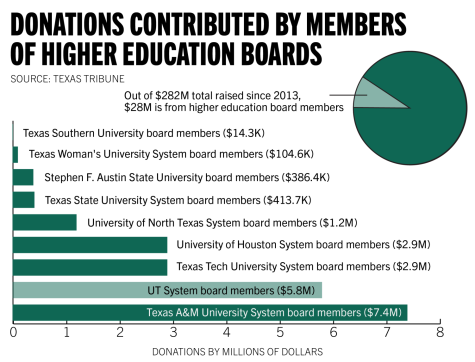UT System board members donated $5.8 million to Abbott campaign since 2013
November 8, 2022
Members of the UT System Board of Regents donated $5.8 million to Gov. Greg Abbott’s gubernatorial campaigns, according to an analysis by The Texas Tribune.
Abbott appointed all 90 members currently serving on nine university system boards in Texas and the Texas Higher Education Coordinating Board. More than 70% of these appointees donated money — with 30% donating over $100,000 — to the governor’s campaign since 2013, making up about 10% of Abbott’s total donations, according to the Tribune.
As of 2021, 40 states have limits on individual contributions to candidates, according to the National Conference of State Legislatures. But Texas has no such monetary limitations.
The nine members of the UT System’s Board of Regents provide policy direction for UT System’s 13 institutions. Their responsibilities include appointing presidents of each institution and setting campus admission standards, according to the Texas Education Code. The governor and Texas Senate ensure appointees have “suitable” experience for the role.

Adjunct law professor Randall Erben said governors often appoint people with similar political ideologies so their goals align.
“It stands to reason that any governor … (is) going to appoint people who may have contributed to his or her campaign, not because the appointee contributed but because the appointee shares their views,” said Erben, a former legislative director for the Abbott administration.
Educational leadership and policy professor of practice Juan Gonzalez said regents are supposed to provide direction and policy for the University, but because they are “agents of the governor,” politics can end up altering their purpose.
“When it is driven by power, structure and politics, … there’s a lot of variance from one decision to another, because the people that are making decisions are measuring the wind of the politics or are accommodating the power structure,” Gonzalez said.
Catherine Frazier, director of media relations for the UT System, said in an email the regents work to improve the system and make “education more accessible and affordable for underserved population.”
The regents are all volunteers, UT alumni and have experience in their respective fields, according to Frazier. Erben said having experts in fields such as business and law improves their decisions. None of the current regents work in education, according to the regents’ biographies on their website.
“It’s like a jigsaw puzzle because you want to make sure that you have a broad array of expertise,” Erben said.
When regents act based on politics, it can lead to an “overreach,” Gonzalez said, such as when Regent Kevin Eltife expressed his “disappointment” with the University of Texas at San Antonio’s president’s decision to remove its “Come and Take It” flag from football games.
The regents can determine the official position of the System on matters of “obviously controversial nature,” according to Regent’s Rule 10101.
Government professor Brian Roberts said factors like ethics also influence regents’ actions.
“It’s not as if the governor announces in advance his preferences on Board of Regents agendas,” Roberts said. “There’s a distance in that relationship.”
Gonzalez said increasing board diversity would make their decisions stronger.
“A single mindedness and single thought gives you a very, very narrow perspective,” Gonzalez said. “Boards typically function much better when there is collaboration, cooperation and joint agreement on the mission and its purpose.”



